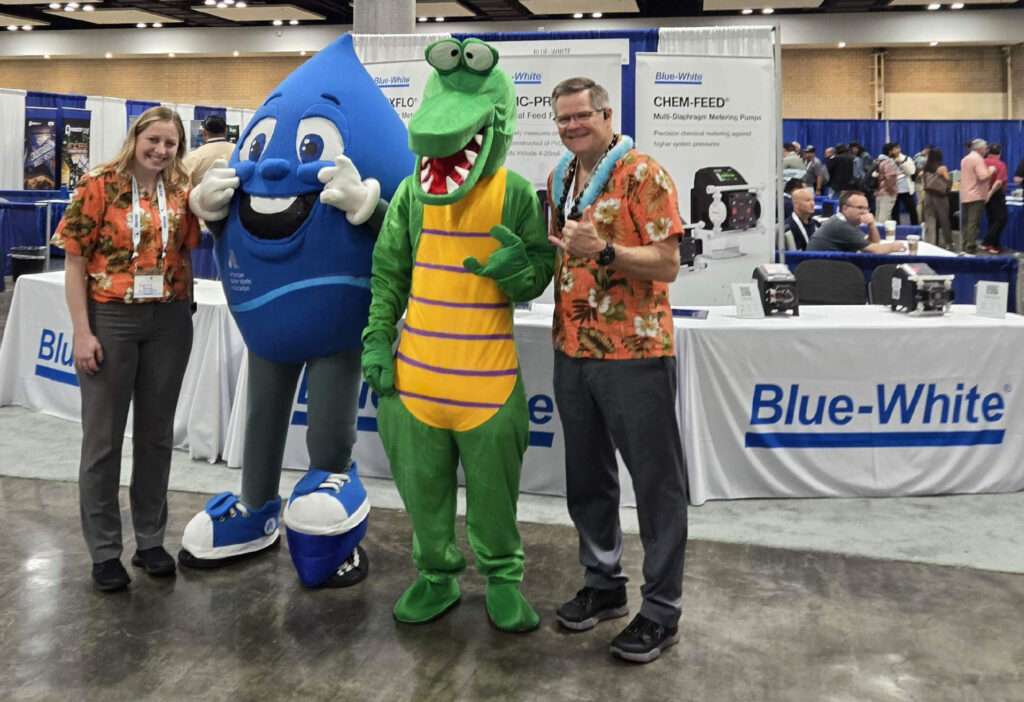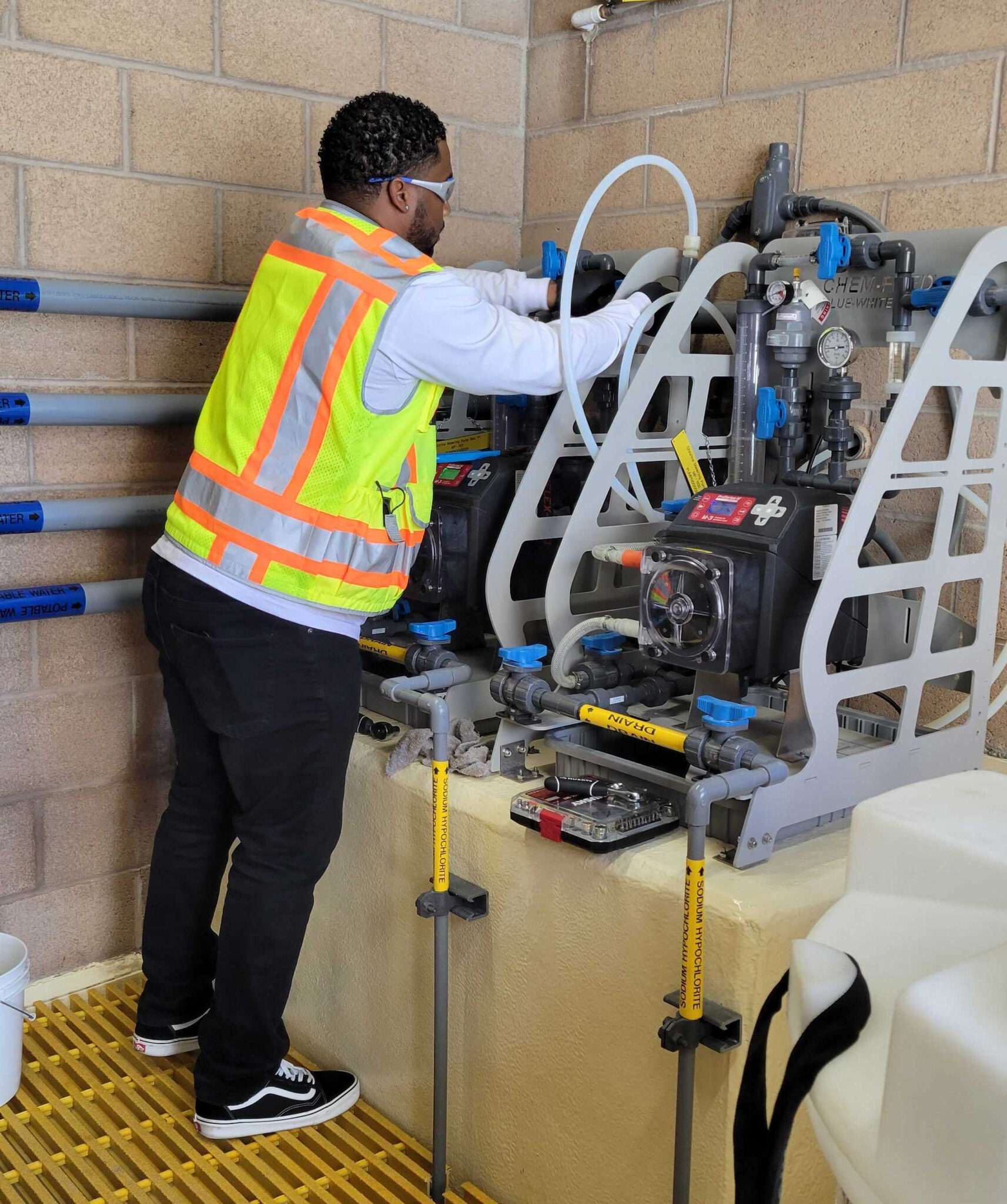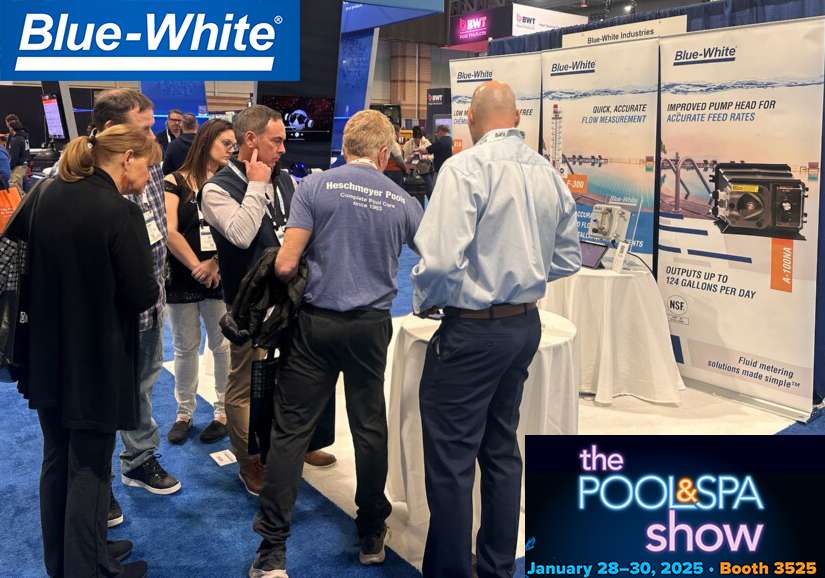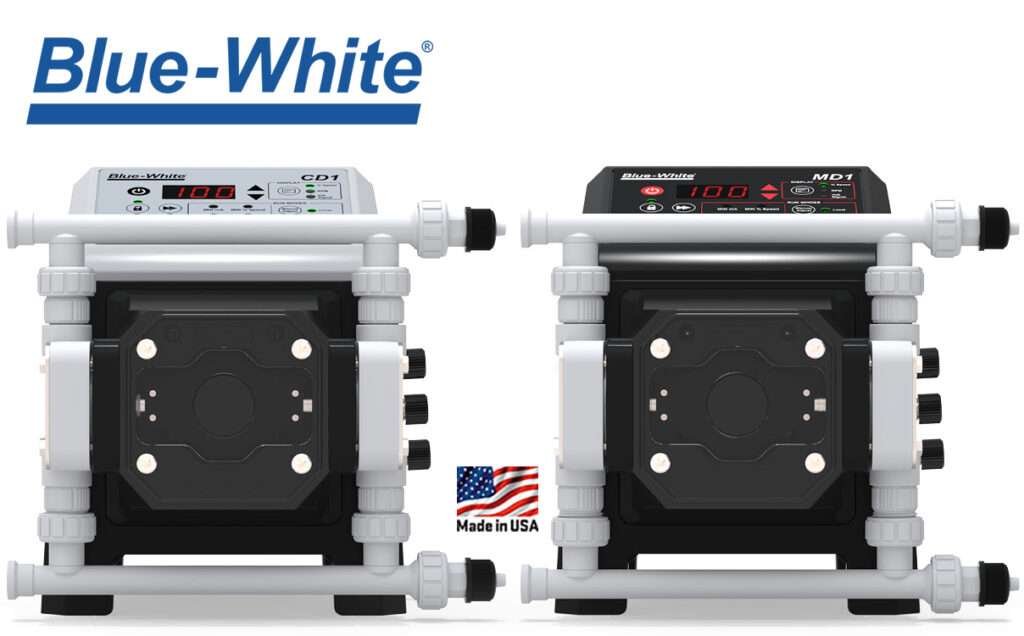
Water Disinfection Pumps & a Visit from ACE Mascot Eddy
It was a busy few days in Honolulu for the Pacific Water

Water treatment processes rely on chemical additions to achieve desired outcomes. This can include disinfection, pH control, or the removal of contaminants. In today’s environment, tolerances for these outcomes are tight, and too much deviation can put communities at risk and result in regulatory action. Not to mention time and money wasted adjusting chemicals. This drives treatment managers to purchase the most accurate chemical metering pumps available.
While accuracy is important, the real lynchpin in process control is the repeatability of the pump. Repeatability is the unsung hero that ensures consistent and predictable dosing minute after minute, day after day. This article will explain the difference between accuracy and repeatability and how each affects treatment processes.
Repeatability and accuracy play distinct roles in achieving effective dosing. A pump’s accuracy refers to how close the measured dose is to the true or desired amount. For example, if a water treatment system requires 1,000 ml/m (milliliters per minute) of a chemical, an accurate system will deliver that within the accuracy tolerance, which is typically within +/- 2% or better.
Repeatability is its ability to deliver the same dose consistently over multiple dosing events. For instance, if a metering pump is asked for 1,000 ml/m and consistently delivers 980 ml/m every time, it has high repeatability even if it is less accurate.
In practical terms, what this all means is that an accurate pump will likely deliver between 980 ml/m and 1,020 ml/m. This range, while tight, still introduces fluctuations into the process that can alter outcomes, particularly if accuracy declines over time as the pump ages. However, a repeatable pump is more predictable, ensuring that outcomes are consistent from dose to dose, regardless of the exact quantity metered.
Neither repeatability nor accuracy are static features. There are factors within a process environment that can impact each. Of the two, however, accuracy has many caveats. For example, an accuracy statement may be based on water using a 3’ suction lift at 60 degrees F with a centipoise of one viscosity. If the application setup requires a 5’ lift, or the ambient temperature in the factory is above 75 degrees, it can change the accuracy of the reading. Similarly, chemicals with higher viscosities that resist flow can throw off the accuracy. Even worse, chemicals such as flocculants and coagulants can be non-Newtonian, which means attempts to increase the flow can actually alter the viscosity, impacting the accuracy of the pump.
By comparison, repeatability can be dependent on the technology used to meter the chemicals. In peristaltic pumps, over time the tubing can lose its memory, varying how much it springs back after compression. This creates variability in its suction and discharge rate, and ultimately its repeatability. A double-diaphragm pump, however, avoids this issue by using two diaphragms that work in tandem — one performs suction while the other performs discharge — to maintain a steady flow rate.
Regardless of accuracy, a repeatable pump offers numerous benefits to a water treatment process:
Tighter process control. Repeatable chemical metering leads to more predictable treatment outcomes with less time spent adjusting processes to keep water quality within desired tolerances.
Less money spent on chemicals. This tighter process control means fewer chemicals wasted on over-dosing and counterdosing (such as during pH adjustment).
Improved labor efficiency. Operators spend less time making adjustments when processes are more reliable and predictable.
Fewer regulatory violations. Plant managers and operators can rest assured that they are meeting environmental and safety requirements.
Easier installation. A repeatable pump eliminates the need for extensive calibration and extra equipment, as it consistently delivers the same performance every time.
Unlike accuracy, repeatability data is rarely included on product specification sheets. To ensure that the pump being purchased is repeatable, is to best to work with those manufacturers that include such data.
For existing pumps, operators can determine a pump’s repeatability by using pH, turbidity, and/or chlorine analyzers to track overall water treatment outcomes. Alternatively, operators can tie a flow meter into their SCADA or other control system, which can indicate if the pump’s output is consistent with the meter data.
Of course, pump condition can impact repeatability as well. As such, operators should stay current on scheduled maintenance tasks, such as cleaning the valves and ensuring the proper function of the motor and other components. This can help prevent issues that could reduce repeatability. Proper maintenance also includes monitoring the condition of peristaltic pump tubing and ensuring that the rollers are clean and free of debris, which can affect the pump’s performance.
While chemical metering accuracy will always matter, repeatability ensures consistent dosing over time, which makes it crucial for reliable process control. Investing in a repeatable pump enhances efficiency, reduces chemical waste, and helps maintain compliance with tight regulatory standards.
Written by:
Blue-White® Industries
714-893-8529

It was a busy few days in Honolulu for the Pacific Water

In January Blue-White attended the Pool Show in Atlantic City and displayed

Steve Hernandez /WaterWisePro and Blue-White®’s own Rich Hopkins proved they’re winners. The pair went up

We’re excited to announce we’ve resumed shipment of CHEM-FEED® CD1 and MD1
Copyright © 2024 Blue-White
| Cookie | Duration | Description |
|---|---|---|
| cookielawinfo-checkbox-advertisement | 1 year | Set by the GDPR Cookie Consent plugin, this cookie is used to record the user consent for the cookies in the "Advertisement" category . |
| cookielawinfo-checkbox-analytics | 11 months | This cookie is set by GDPR Cookie Consent plugin. The cookie is used to store the user consent for the cookies in the category "Analytics". |
| cookielawinfo-checkbox-necessary | 11 months | This cookie is set by GDPR Cookie Consent plugin. The cookies is used to store the user consent for the cookies in the category "Necessary". |
| CookieLawInfoConsent | 1 year | Records the default button state of the corresponding category & the status of CCPA. It works only in coordination with the primary cookie. |
| elementor | never | This cookie is used by the website. It allows the website owner to implement or change the website's content in real-time. |
| viewed_cookie_policy | 11 months | The cookie is set by the GDPR Cookie Consent plugin and is used to store whether or not user has consented to the use of cookies. It does not store any personal data. |
| Cookie | Duration | Description |
|---|---|---|
| _ga | 2 years | The _ga cookie, installed by Google Analytics, calculates visitor, session and campaign data and also keeps track of site usage for the site's analytics report. The cookie stores information anonymously and assigns a randomly generated number to recognize unique visitors. |
| _gat_gtag_UA_85334924_1 | 1 minute | Set by Google to distinguish users. |
| _gid | 1 day | Installed by Google Analytics, _gid cookie stores information on how visitors use a website, while also creating an analytics report of the website's performance. Some of the data that are collected include the number of visitors, their source, and the pages they visit anonymously. |
| CONSENT | 2 years | YouTube sets this cookie via embedded youtube-videos and registers anonymous statistical data. |
| Cookie | Duration | Description |
|---|---|---|
| VISITOR_INFO1_LIVE | 5 months 27 days | A cookie set by YouTube to measure bandwidth that determines whether the user gets the new or old player interface. |
| YSC | session | YSC cookie is set by Youtube and is used to track the views of embedded videos on Youtube pages. |
| yt-remote-connected-devices | never | YouTube sets this cookie to store the video preferences of the user using embedded YouTube video. |
| yt-remote-device-id | never | YouTube sets this cookie to store the video preferences of the user using embedded YouTube video. |
Please fill out the form to request a quote.
A sales rep will reach out to you.
| Image | Catalog Number | Description | Price | Buy |
|---|